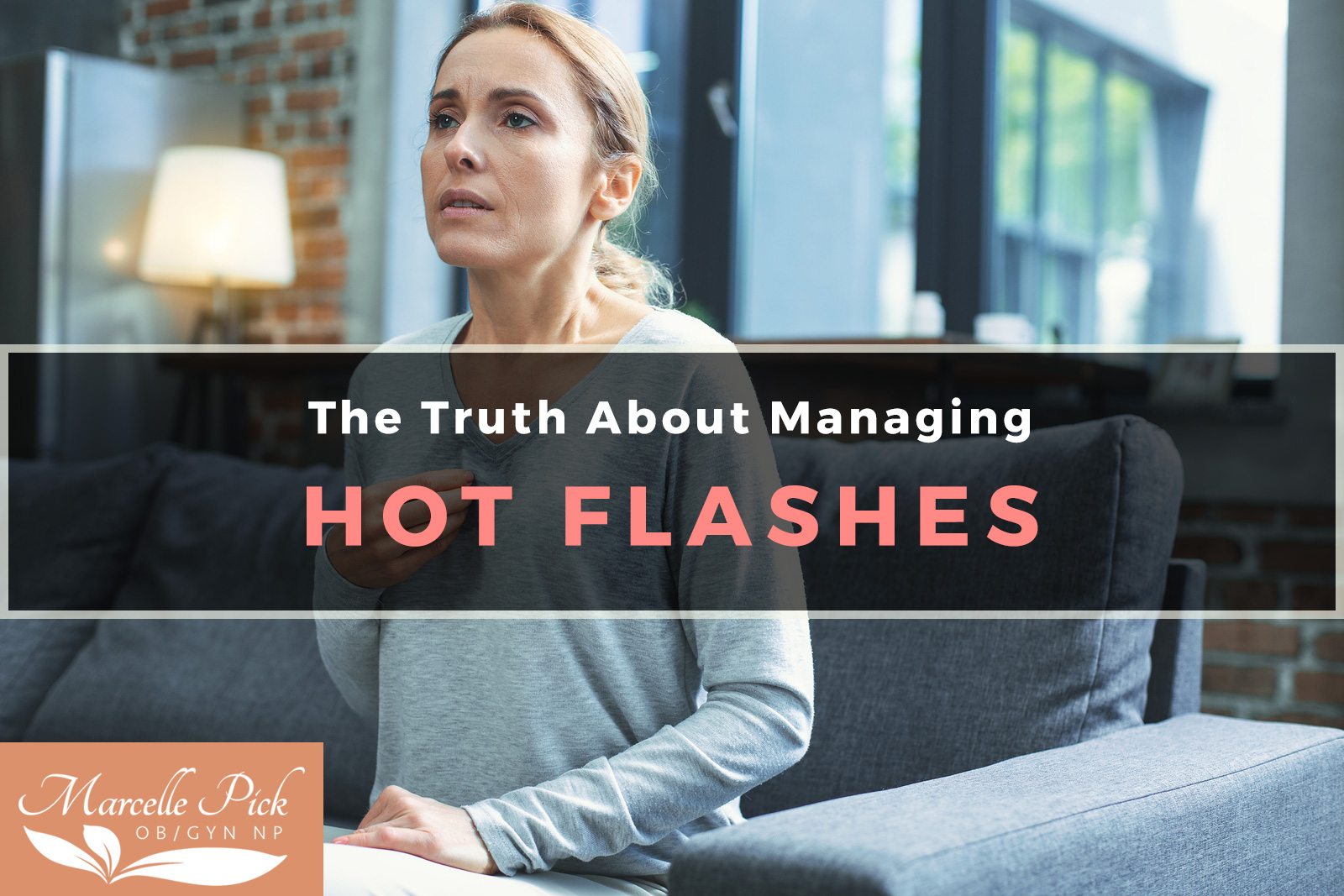A friend of mine, Vicki, recently told me that she’d been conducting a training session, standing in front of a crowded room full of people eager to hear the information she had to share, when suddenly a feeling of intense heat flooded her body, leaving her unable to concentrate, or do much of anything at all, until it had passed. Luckily, she said, the room was full of middle aged women just like her, so when she regained the ability to speak, she simply said “hot flash” and everyone simply nodded sympathetically.
They got it, as most women of a certain age will. Still, Vicki said, it was startling and embarrassing to have to stop like that. “Do I just have to deal with this?” she asked me. My answer is a resounding “No!”
So many women tell me that they’re suffering from hot flashes when they come to see me. And their immediate thought is that they either have to live with them or start hormone replacement therapy. That’s what they’ve been told by conventional medical practitioners, and that’s what they’ve heard from their friends.
Yes, hot flashes are an indication that hormone levels aren’t stable, but taking hormone replacement therapy shouldn’t be the first suggestion. Hormone levels fluctuate all the time, and often you’ll feel symptoms when these levels are just the tiniest bit off. If you jump right into HRT you could swing the balance too far the other way and make your symptoms even worse! And the women who come to me are looking for another way to keep themselves healthy and feeling fantastic. I’m happy to be able to tell them that they are right – there is another way.
Women have far more personal control over their health – and their hormone levels – than they think. The choices they make in how they live their lives can make all the difference. And it doesn’t take drastic changes to turn things around. Even small baby steps can put you on the right path.
I’ll cover to those steps in a minute, but first, it’s important to understand what hot flashes are and why they happen.
What is a Hot Flash?
Hot flashes are impossible to understand until you’ve experienced one. They can come on suddenly, stopping you in your tracks, much like they stopped Vicki during her presentation. While a sudden feeling of heat spreading up your torso and face is part of the experience of a hot flash (and where the name comes from), there’s often more to it than that. You may also feel your heartbeat speed up, break into a sweat, and your face may turn red and blotchy. As the hot flash subsides, you might feel chilled. Many women tell me they have to get up in the middle of the night sometimes to change their clothing because they are so soaked with sweat.
Hot flashes can be mild or severe, last a minute or several, and happen infrequently or as often as every ten minutes (in the most extreme cases). Many people assume that a dramatic drop in estrogen is the cause, but that’s simply not the case. It’s fluctuations in all hormones that cause hot flashes. And those fluctuations happen under so many different circumstances, especially when a woman hits middle age.
Related article: Will My Hot Flash Lead to a Heart Attack?
Also contrary to popular belief, hot flashes don’t disappear when you’ve made it through menopause. I hear all the time from women who are in their mid 50s who thought they were out of the “danger zone.” Many of them never even experienced hot flashes, and think they got off easy — but then, stress hits, and the coping mechanisms they turn to – caffeine, alcohol, sugar – contribute to imbalances and all of a sudden, the hot flashes come on with a vengeance.
But here’s the good news — the amount of hormones your body produces daily is really quite small. So it doesn’t take long to level them out again if they are out of whack, as long as you catch the problem early. Those hot flashes are early warning signs that something is amiss — you need to listen to them!
Are Hot Flashes Inevitable?
Although not all women experience hot flashes, studies show that 80% of women will at some point in their lives. And some women can experience hot flashes for more than a decade! The average length of time that vasomotor symptoms like hot flashes endure is more than seven years, according to a study in 2015. That’s far too long to simply “deal” with it!
There are some factors that increase risk of having hot flashes, including smoking, obesity, and ethnicity. You can’t change your ethnicity, or genetic predisposition to hot flashes, but lifestyle choices can make a big difference for many women.
In addition to those risk factors, other common triggers for hot flashes include caffeine, spicy foods, alcohol, sugar, stress, and hot weather. Exercising in warm climates could make hot flashes worse.
The good news is, once you know what your triggers are, you know what changes you can make to find relief. It’s all up to you! Isn’t it great to have so much control over your own health?
What Message Are Your Hot Flashes Sending?
Research is clear that hormonal changes are the driving factor in a hot flash. But the real question is why are your hormones changing? What is going on at a deeper level? That’s the question you should ask any time you find yourself dealing with uncomfortable symptoms. Masking these symptoms with prescriptions doesn’t take care of the problem – and can make it much worse!
Hormonal imbalances come from so many different sources that it’s impossible to address them all here. Sometimes, there is serious disease at play, but more often there are things that are within your personal control that can be causing serious disturbances in hormone levels. Symptoms like hot flashes are your first warning that something needs to change. Prolonged periods of disproportionate hormone levels can lead to adrenal dysfunction, which has far more serious symptoms associated with it. So let’s see what you can do to avoid getting to that point and get your hormones back on track.
How to Take Personal Control Over Hot Flashes
Remember how I said that the power is in your hands? Sometimes, it’s easy to forget that. When I was talking to Vicki, I asked a few questions about how she’d been eating, sleeping, and managing her stress. Her response was “not well.” I reminded her how much of an impact those things could have on symptoms, and urged her to examine her lifestyle choices. A few weeks later, we talked again and I asked if she was still dealing with hot flashes. With a big smile, she said it had been at least a month since the last one — and all because she took charge! For Vicki, giving up her evening glass of red wine and paying close attention the food she was eating was the key.
Every woman is a unique individual, so what worked for Vicki might not work for you — you have to pay close attention to what is happening in your body, and you might have to try a few things to find the right solution. But there are some recommendations I make to all my patients who complain of hot flashes and other hormonal symptoms. Here are a few:
5 Lifestyle Changes for Natural Hot Flashes Treatment
1. Avoid Processed Foods
Choose whole fresh foods, and eat organic whenever possible. Eat grass-fed meats, wild salmon and other fish rich in omega 3 fatty acids. Avoid foods with ingredients you can’t pronounce. Learn how easy – and delicious – cooking from scratch can be when you grill or use an air fryer.
2. Cut Down on Sweet Treats
If you have to pick just one thing to start with, I think cutting out sugar is the best option! Sugar impacts so many hormones, starting with insulin which is responsible for regulating your blood sugar levels. And you have to be vigilant; sugar is hiding everywhere! Read labels carefully, and opt for products with no added sugar.
3. Reduce Your Stress Levels
Living in a state of constant chaos is one of the worst things you can do for your health. Cortisol and adrenaline, when constantly out of balance, slow down symptom relief, even if you are making otherwise healthy choices. That’s why it is so important to take time for yourself. Meditate, go for a long walk, spend time in the grass with your shoes off, connecting to nature.
Related article: Is Stress Aging You Before Your Time?
4. Break Bad Habits
Caffeine, alcohol and nicotine are often triggers. It’s time to decide if the feeling these substances give you is worth the trade off of having hot flashes and other symptoms. Try substituting herbal tea for coffee if you love a warm beverage in the morning, and learn how to make fun “mocktails” instead of regularly indulging in alcoholic beverages.
5. Support Your Body With Supplementation
Making the appropriate changes can take time, and if your hormones have been out of balance for a long time, you may need some gentle support as you get back on the right track. Many women find relief with my Menopause Support, specifically developed to help ease the arduous symptoms that often accompany menopause.
Because of the way our food is grown, I also think that all women can benefit from a high-quality multivitamin, and a supplement with essential fatty acids.
I realize that making lifestyle changes may not be as easy as it sounds. But it’s not hard to take a few small steps in the right direction. I think that once you do, you’ll notice such a difference it will make the next steps easier to take.
Why You Shouldn’t Just “Live With It.”
When women tell conventional health care practitioners they don’t want to take prescriptions to deal with hot flashes, they are often told that the only alternative is to “live with it.” I think that’s absurd, for a couple of reasons.
First, women should never be told that a symptom is something they have to suffer through. Symptoms are the only way your body has to send a message that something else is going on. That’s why I think it’s important to find out what the root cause is, instead of simply masking the symptoms with medications you end up having to take long term when you don’t look for the real problem.
Second, and more importantly, not addressing hot flashes at all can mean more serious health conditions develop as time passes. Again, these hot flashes are a distress signal, not something to ignore. Night sweats – which happen when you have hot flashes while you are asleep – disrupt quality sleep, and can lead to chronic insomnia. And sleep is so important to hormonal balance (as well as overall good health) that the pattern of interrupted sleep can continue until those imbalances are addressed.
Finally, although women most frequently experience hot flashes in conjunction with menopause, these bothersome symptoms could be caused by disease. A 2017 study found a link between hot flashes and heart disease, and other research has found an association between hot flashes and lower bone density. And in December of 2017 a study showed a connection between hot flashes and increased risk of diabetes. That’s a lot of good reasons to pay attention to the messages your body is sending!
Stop Hot Flashes in Their Tracks – Before They Stop You!
The sooner you begin taking steps to balance out your hormones, the sooner you can say goodbye to hot flashes and night sweats. Then, like Vicki, you can do anything – even stand in front of a room full of people – with confidence that you’ll be able to complete anything you start without interruption. It won’t be easy, but when you find yourself symptom-free and able to enjoy all that life has to offer, I think you’ll find it’s worth it. No dessert or drink with dinner compares to feeling calm, cool and collected as you breeze through menopause!
References:
https://www.mayoclinic.org/diseases-conditions/hot-flashes/symptoms-causes/syc-20352790
https://www.beautifulonraw.com/hot-flashes%E2%80%94what-are-they-telling-you.html







